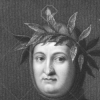Petrarch

Petrarch
Francesco Petrarca, commonly anglicized as Petrarch, was an Italian scholar and poet in Renaissance Italy, and one of the earliest humanists. Petrarch's rediscovery of Cicero's letters is often credited for initiating the 14th-century Renaissance. Petrarch is often considered the founder of Humanism. In the 16th century, Pietro Bembo created the model for the modern Italian language based on Petrarch's works, as well as those of Giovanni Boccaccio, and, to a lesser extent, Dante Alighieri. Petrarch would be later endorsed as...
NationalityItalian
ProfessionPoet
Date of Birth20 July 1304
CityArezzo, Italy
CountryItaly
For virtue only finds eternal Fame.
All pleasure in the world is a passing dream.
Virtue is health, vice is sickness.
Gold, silver, jewels, purple garments, houses built of marble, groomed estates, pious paintings, caparisoned steeds, and other things of this kind offer a mutable and superficial pleasure; books give delight to the very marrow of one's bones. They speak to us, consult with us, and join with us in a living and intense intimacy.
Suspicion is the cancer of friendship.
If a hundred or a thousand people, all of the same age, of the same constitution and habits, were suddenly seized by the same illness, and one half of them were to place themselves under the care of doctors, such as they are in our time, whilst the other half entrusted themselves to Nature and to their own discretion, I have not the slightest doubt that there would be more cases of death amongst the former, and more cases of recovery among the latter.
Man has not a greater enemy than himself.
Five enemies of peace inhabit with us - avarice, ambition, envy, anger, and pride; if these were to be banished, we should infallibly enjoy perpetual peace.
Love is the crowning grace of humanity, the holiest right of the soul, the golden link which binds us to duty and truth, the redeeming principle that chiefly reconciles the heart to life, and is prophetic of eternal good.
Love is the crowning grace of humanity.
True, we love life, not because we are used to living, but because we are used to loving. There is always some madness in love, but there is also always some reason in madness.
To be able to say how much you love is to love but little
The aged love what is practical while impetuous youth longs only for what is dazzling.
Books never pall on me. They discourse with us, they take counsel with us, and are united to us by a certain living chatty familiarity. And not only does each book inspire the sense that it belongs to its readers, but it also suggests the name of others, and one begets the desire of the other.